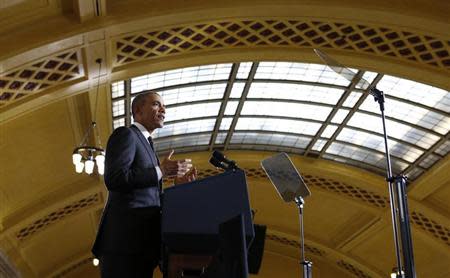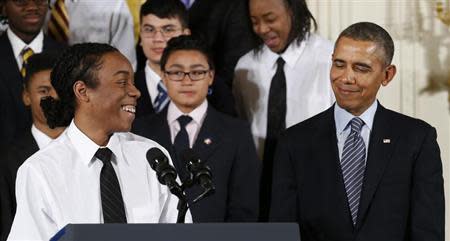Obama launches personal effort to propel black and Latino boys
By Jeff Mason WASHINGTON (Reuters) - President Barack Obama on Thursday launched a very personal appeal to help improve opportunities for boys from minority groups who, he said, resembled him as a youth and faced statistical challenges that their white peers did not. Noting that he grew up without a father and made poor choices including drug use, Obama said that helping black and Hispanic boys succeed was a moral and an economic imperative for the United States. "This is an issue of national importance. This is as important as any issue that I work on," Obama said at a White House ceremony with 20 young men "of color" standing on risers behind him. The program, which will involve increasing mentorship opportunities and efforts aimed at reducing violence among minority boys, is an example of an issue that Obama is pushing on his own while conflicts with Congress prevent him from advancing more ambitious legislative priorities. It could be an important part of the legacy of a president who, despite having nearly three years left in office, is already fighting to avoid being overshadowed by speculation about his successor in the 2016 presidential election. Advisers described Obama's involvement in the issue as very personal, and the president's remarks highlighted his own outrage at statistics that show minority youth facing huge personal and societal roadblocks. Some 86 percent of black boys and 82 percent of Hispanic boys read below proficiency levels in fourth grade, compared with 58 percent of white boys reading below such levels, according to statistics cited by the White House. Disproportionate numbers of Latino and African American young men enter the U.S. criminal justice system as well and are more than six times as likely as white young men to be murdered. "The worst part is, we've become numb to these statistics," Obama, the first black U.S. president, told the audience. "We just assume this is an inevitable part of American life instead of the outrage that it is," he said to applause. Through a program called "My Brother's Keeper," Obama is hoping to change the trajectory he described. A new government task force will study programs that are helping to address the problems and recommend ways to expand those that work well. The group, made up of different government agencies, will also look at federal policies and regulations that address the issue. Separately, the White House said several foundations would pledge to invest at least $200 million in programs that address early childhood development, parenting, 3rd grade literacy, and school discipline reform. The groups include Bloomberg Philanthropies and the Ford Foundation among others. PERSONAL A year ago Obama met a group of boys at a school near his Chicago home. During that visit, he and the boys shared their own personal stories. "When it was my turn, I explained to them when I was their age, I was a lot like them. I didn't have a dad in the house. And I was angry about it, even though I didn't necessarily realize it at the time," Obama said. "I made bad choices. I got high without always thinking about the harm that it could do. I didn't always take school as seriously as I should have. I made excuses. Sometimes I sold myself short." His words inspired 18-year-old Christian Champagne, one of the young men who was present. Champagne introduced Obama at the White House ceremony on Thursday. "To my surprise, he was just like me," Champagne said. Obama shook hands with all of the youths when he finished his remarks on Thursday and offered hugs to many of them, lingering in a tight embrace with one. Valerie Jarrett, a senior White House adviser and friend of the president, told reporters that Obama and his wife Michelle intended to keep working on the issue after his presidency concluded. "Across the country, communities are adopting approaches to help put boys and young men of color on the path to opportunity and success. The president intends to build on that work, and that's what this initiative is all about," she said. (Reporting by Jeff Mason; Editing by Ken Wills)


